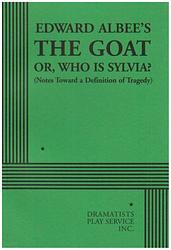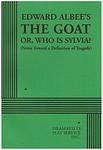The Goat, Or Who Is Sylvia? by Edward Albee
The play centers on a successful middle-aged architect whose life unravels when he confesses to his family that he has fallen in love with a goat named Sylvia. This revelation shocks his wife and gay teenage son, leading to a tumultuous exploration of the limits of tolerance, societal norms, and the nature of love. As the protagonist defends his affair, the narrative delves into themes of infidelity, the breakdown of family, and the questioning of conventional morality, ultimately challenging the audience to confront the boundaries of their own acceptance.
The 10629th greatest book of all time
Ranking Details:
Our ranking system awards points to books based on their appearance and position on curated lists. Here's how it works:
Unranked Lists: For lists without specific rankings, each book receives points equivalent to the list's weight. This approach recognizes the book's inclusion on prestigious lists.
Ranked Lists: Books on ranked lists receive points in two ways:
- Base Points: Initially, every book is awarded points equal to the list's weight, acknowledging its significance.
- Bonus Points: Additionally, books earn bonus points based on their ranking. The total bonus pool, equal to 100% of the list's weight, is distributed among the books, with higher-ranked books receiving more points.
Exponential Distribution: The distribution of bonus points follows an exponential model. This means the top-ranked book (#1) receives significantly more bonus points than those further down the list (e.g., #100). Our algorithm ensures that higher placements are rewarded more generously, reflecting the achievement of a top rank on any given list.
This scoring system ensures that each book's ranking reflects both its presence on multiple lists and its positions within those lists, providing a comprehensive measure of its acclaim and popularity.
Total Points: 18
Since this book was first published in 2000, there is a penalty of 41.6%. The age adjusted score is 10.51.
This is to prevent newer books from reaching super high on the ranked list of the greatest books of all time. The greatest books should also stand the test of time.
- score: 15 -- The 101 GREATEST PLAYS of the Past 100 Years (1920-2020) (Weight: 15)
- score: 3 -- From Oedipus to The History Boys: Michael Billington's 101 greatest plays (Weight: 3)

